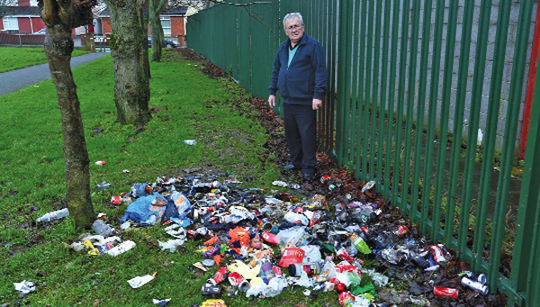THE level of illegal dumping in some Northside areas has now reached crisis level and is a threat to public health, according to a local councillor.
Donaghmede ward councillor MÃcheál Mac Donncha (SF) raised the issue of widespread illegal dumping, especially on the Northside, at Dublin City Council’s January meeting.
Cllr Mac Donncha is calling on the city manager to take additional steps, in conjunction with the gardai, to address the growing problem, including deterrent measures, detection and prosecution of offenders.
“We are seeing dumping in public open spaces on a daily basis with offenders repeatedly dumping rubbish in particular spots such as outside Kilbarrack train station, Belcamp Lane and in our public parks,
? said Cllr Mac Donncha.
“This has now reached crisis level and is a public health hazard. This dumping is to be deplored. It is anti-social and those who do it are irresponsible.
“While in no way excusing those who commit these offences, we did predict that with the privatisation of the bin service, the increase in bin charges and the abolition of the waiver scheme we would see an increase in illegal dumping.
?
Cllr Tom Brabazon (FF) also called for urgent action. He described the behaviour as
“criminal and downright unpatriotic”.
“This week alone I have had very serious complaints of dumping of household waste in Streamville Park in Donaghmede, and around the Darndale and Belcamp area,
? he said.
“This is all happening in the year of The Gathering – designed to help our standing internationally and to bring in tourists to bolster our ailing economy.
“This dumping is not going to help the situation whatsoever.
?
Local man Freddie Skelly highlighted the situation at Streamville Park, Donaghmede, where the dumping is particularly bad.
“People are driving by at night and parking close to the entrances and leaving black sacks of rubbish,
? Mr Skelly told Northside People.
“In some cases they are burning the rubbish to cover their tracks and make sure they can’t be traced. They leave the bags at the gates and in the fields.
“The problem is getting worse and there seems to have been a massive increase since the bin service was privatised.
“It got really bad after Christmas when people had much more rubbish than usual and the bills were coming in.
?
Mr Skelly, who has been living in Donaghmede for 43 years, said it was very sad to see the illegal dumping in the area.
“The residents are very upset and it’s becoming a health hazard,
? he stated.
“Local people use the park to walk their dogs and the kids use it for playing sports.
?
Mr Skelly added:
“Dublin City Council’s parks department are doing great work in clearing the rubbish, in fairness.
?
A spokeswoman for the city council said the illegal dumping of waste is
“unfortunately
? a problem that has existed for a very long time in Dublin.
“This issue is monitored by our waste management staff and every effort is made to bring those responsible to task,
? she told Northside People.
“As well as our own efforts at enforcement and cleanups, council staff work closely with local communities to encourage and support efforts in relation to local neighbourhoods.
“Initiatives such as City Neighbourhoods and Pride of Place are important in this regard.
?
When asked if there has been a substantial increase in the number of illegal dumping reports since the bin service was privatised, the spokeswoman said:
“In relation to quantification of the problem, the council has in recent years carried out regular surveys of the dumping problem.
“These surveys do not suggest that there has been any increase in dumping relating to the city (council) exiting the waste collection market.
?
The spokeswoman said CCTV cameras are installed at locations where vehicles are known to be used in the commission of an offence.
“Footage is obtained of the registration number of the vehicle involved and litter fines are issued,
? she stated.
“Where major dumping takes place at sites where CCTV cameras are installed, a direct prosecution is initiated.
“Litter wardens also remove illegally dumped bags, search for evidence and issue fines where evidence is found.
?
She added:
“The council is always looking at what new initiatives can be taken to deal with this problem.
?
